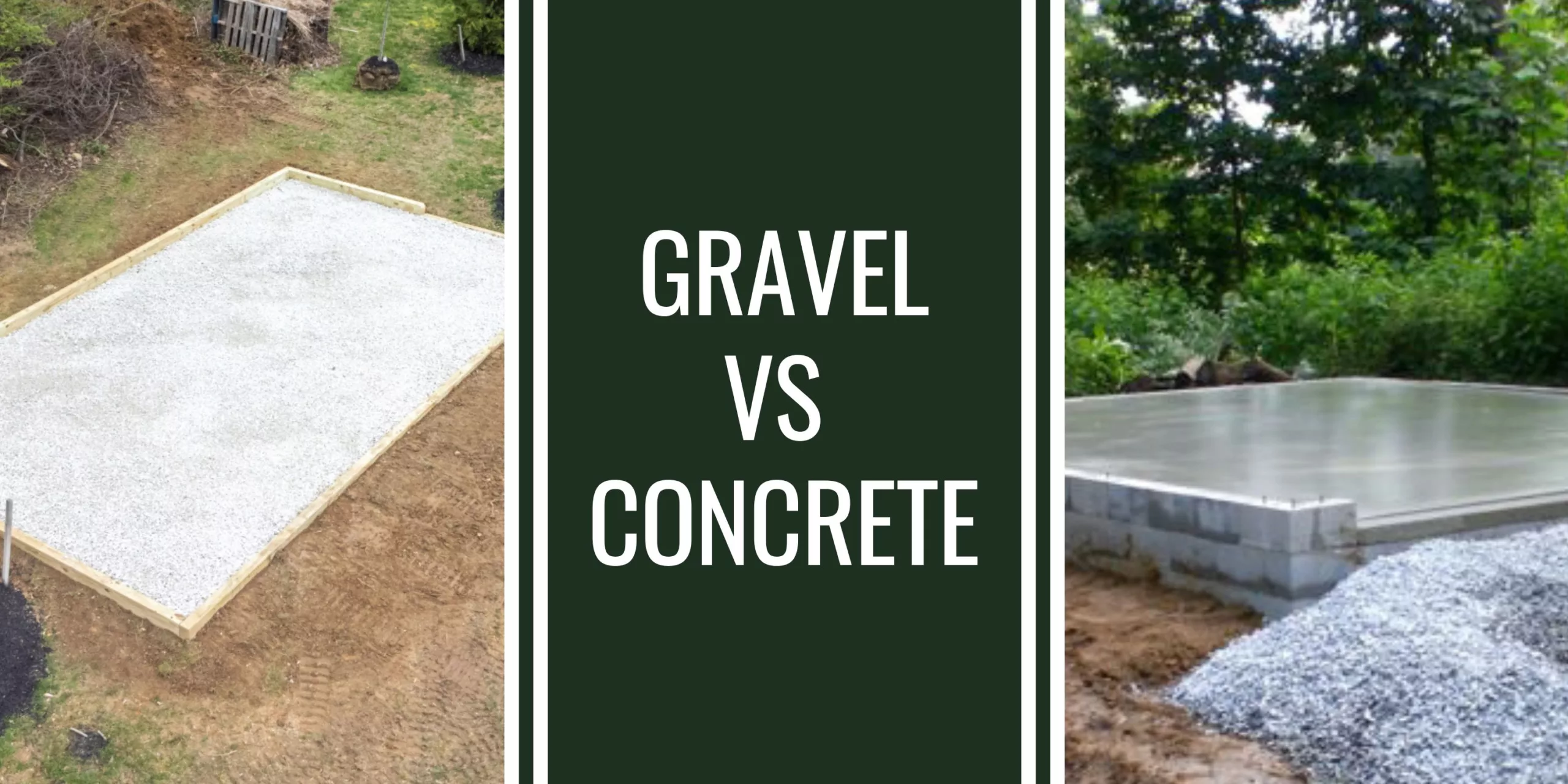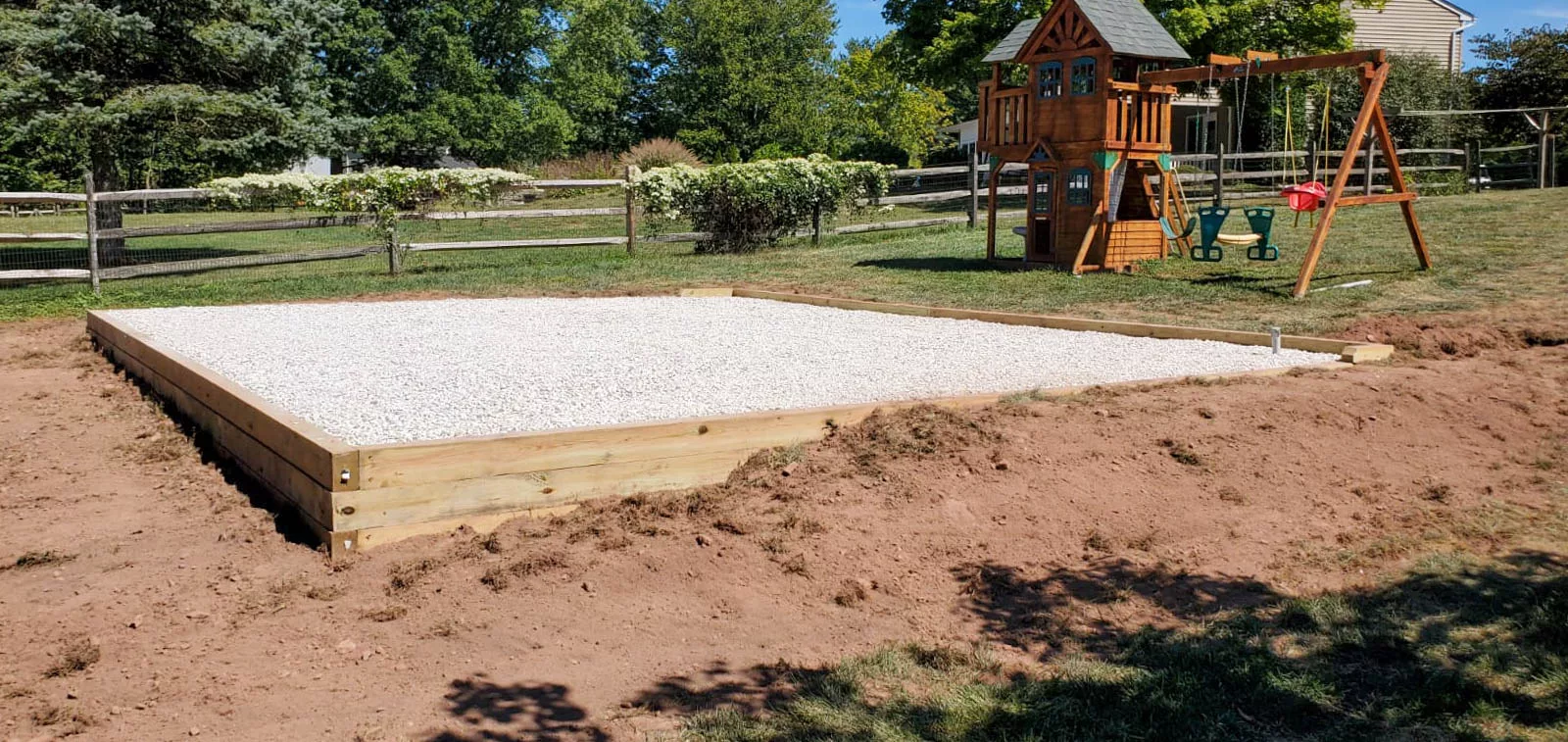Gravel vs Concrete: Which Foundation Should You Get in 2023

The foundation of any construction project is arguably the most important part of the structure. It provides the stability and support necessary to ensure the safety and durability of the building. Choosing the right foundation is critical to the success of the project, and can have significant implications for the cost, timeline, and overall quality of the finished product.
There are many advantages and some disadvantages for the foundation you choose. Some include cost, drainage, stability, & durability. Let’s take a closer look at both foundations and see which may be right for you.

A gravel foundation is a type of foundation used in construction that involves filling a trench or excavation area with layers of crushed stone or gravel. The layers of gravel are compacted and leveled to create a stable base for the structure that will be built on top of it. Gravel foundations are often used for smaller structures, such as sheds or storage units, as they are less expensive and easier to install than other types of foundations.
Advantages of Gravel Foundations
- Cost-effective: A gravel foundation is generally less expensive than other foundation materials such as concrete. This makes gravel foundations an attractive option for smaller projects or those with a limited budget.
- Drainage: Gravel provides excellent drainage properties, allowing water to percolate through the layers and away from the foundation. This helps prevent issues with standing water and moisture buildup, which can be detrimental to the structure built on top of the foundation.
- Environmental impact: Gravel is a natural and locally sourced material that does not require significant resources to produce. It is also recyclable and reusable, making it a more sustainable option than other foundation materials.
Disadvantages of Gravel Foundations
- Stability: Gravel foundations may not be as stable as other types of foundations, particularly in areas with soft soil or high groundwater. Over time, the gravel may shift or settle, which can lead to structural damage.
- Erosion: Gravel can be prone to erosion over time, particularly in areas with heavy rainfall or runoff. This can cause the foundation to shift and settle, which can compromise the stability of the structure built on top of it.
- Durability: Gravel is not as durable as other foundation materials, such as concrete, and may require more frequent maintenance and repairs. Over time, the gravel may become compacted or displaced, which can lead to issues with drainage and stability.
Concrete Foundations

A concrete foundation is a type of foundation used in construction that involves pouring a mixture of concrete and other materials into a trench or excavation area. The mixture is then leveled, smoothed, and allowed to cure, creating a solid base for the structure that will be built on top of it. Typically, concrete foundations are used for garages, commercial buildings, homes.
Advantages of Concrete Foundations
- Stability: Concrete foundations provide excellent stability and can withstand heavy loads and strong winds. They are ideal for larger and more complex structures that require a high level of stability and load-bearing capacity.
- Durability: Concrete is a very durable material and can last for many decades without significant maintenance or repairs. It is resistant to weathering, moisture, and pests, making it an ideal choice for foundations in a wide range of environments.
- Versatility: Concrete foundations can be designed to meet a wide range of requirements based on the specific needs of the construction project. They can be poured in a variety of shapes and sizes, and can be customized with features such as footings, walls, and drainage systems.
Disadvantages of Concrete Foundations
- Cost: Concrete foundations can be more expensive to install than other types of foundations, particularly for smaller or simpler structures. The cost of materials, labor, and equipment can add up quickly, making concrete foundations a less attractive option for those on a tight budget.
- Environmental impact: The production and transportation of concrete can have a significant environmental impact, contributing to greenhouse gas emissions and other environmental issues. Additionally, the excavation and preparation of the site for a concrete foundation can also cause disruption to the local ecosystem.
- Difficulty of installation: Concrete foundations can be difficult and time-consuming to install, particularly in areas with poor soil conditions or high water tables. The process involves excavation, formwork, pouring, and curing, all of which require specialized equipment, skilled labor, and careful attention to detail.
Factors to Consider When Choosing A Foundation
Choosing a foundation can be an overwhelming task due to the wide variety of formulas and shades available. To make sure you choose the right foundation, it is important to consider several factors. From finding the right shade and formula to understanding your skin type, here are some factors you should consider when choosing a foundation.
Soil Conditions
The soil conditions are an important factor to consider when choosing a foundation for a structure. Depending on the type of soil, different foundations may be necessary to provide adequate support for the structure. For example, if the soil is composed of clay or sand, then it will require a deep foundation system such as driven piles or drilled caissons. Additionally, if the soil has high water content, then it is important to choose waterproofing solutions such as membranes and coatings to protect against moisture damage. Taking into account all of these factors can help ensure that your home’s foundation is constructed safely and securely.
Climate
Different climates require different types of foundations, and it’s important to do research before starting construction to ensure you choose the best material for your project. By taking into account both climate conditions and personal preferences, you can make sure that you choose the best foundation material for your needs.
Building Codes
In order to ensure that your building is safe and compliant with local laws, you should consider researching the codes and regulations of your local jurisdiction before selecting a foundation. This research can help you make sure that any future changes made to the building would be compliant with the latest codes and regulations. Additionally, it is important to make sure that any materials used are up-to-date and meet safety standards as outlined in these codes. By following these steps when selecting a foundation for your building project, you can ensure that you are meeting all necessary safety requirements and avoiding costly issues down the line.
Budget & Timeline
When looking to build a foundation, it is important to consider both budget and timeline when making your decision. A successful foundation requires careful planning and an awareness of the resources needed for completion. It is important to ensure that the budget is realistic for the size of the project and that the timeline allows for unforeseen delays.
By considering budget and timeline up front, you can be sure that your project will stay on track, within budget, and completed in a timely manner. Careful research into different materials, contractors, and other costs associated with building a strong foundation will help you make an informed decision when selecting what works best for you.
Which Foundation Should You Choose?
Each type of foundation, whether it be gravel or concrete, has its own advantages and disadvantages, and the best choice will depend on the specific needs and circumstances of the project. By carefully considering these factors, builders and contractors can select a foundation that is safe, stable, and cost-effective, and that meets all the necessary building codes and regulations. Ultimately, choosing the right foundation requires a thoughtful and informed approach, with a focus on ensuring the long-term durability and success of the construction project.
